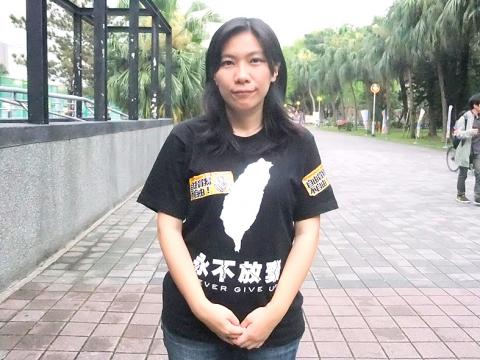The unprecedented occupation of the Legislative Yuan has thrust two young men, Lin Fei-fan (林飛帆) and Chen Wei-ting (陳為廷), into the media spotlight.
Yet the perceived success of the student movement against the controversial service trade agreement does not belong to them alone, but is also shared by many students who have made it their life mission to usher in changes to the nation. Chou Fu-i (周馥儀), a 33-year-old doctoral candidate at National Taiwan University’s Department of History, may seem no different from other students, but those familiar with the operation of the student movement would describe her as one of the heroines behind the scenes.
Referring to herself as a “cultural movement facilitator,” Chou is the chief coordinator of the Sunflower movement and was one of the hundreds of students that broke into and seized the legislature on March 18.

Photo: Taipei Times
Not appearing in front of cameras, does not make the weight of Chou’s role any lighter.
She is responsible for handling everything that happens both inside and outside the legislature, from organizing defensive tactics against gangsters attempting to attack anti-pact protesters to managing family members of political victims wanting to enter the legislature to express support to the student protesters in person.
Having taken part in the movements against the Kuokuang Petrochemical Technology Co’s proposed eighth naphtha cracker development project and the government’s forced appropriation of farmlands in Miaoli County’s Dapu Borough (大埔), Chou is arguably a veteran social activist.
She has endeavored to bring major social issues to the attention of the public, whether by teaming up with high-profile celebrities or resorting to the soft power of words, music and movies.
“I often ask myself: ‘What can I do to create a better social movement?’” Chou said.
That question prompted her to approach Taiwanese blockbuster filmmaker Wei Te-sheng (魏德聖) and ask for his approval to screen his latest work, Kano, at the legislature on Monday to lift the spirits of the protesters.
“The main idea of the movie is that people should never be afraid of failure. Most people are of the opinion that social movements can hardly make a difference, but I want to show them there is still hope to help them abandon such defeatism,” Chou said.
Chou has shed 5kg in weight over the past two weeks, with the fears of a possible police break-in and the pressure to play a helpful role in the movement.
“I only have to see people singing on the street to entertain protesters and students sitting in a circle outside the legislature discussing the trade agreement to feel alright again,” she said.
Chou said she had worried that the trade agreement might “blur” Taiwan’s artistic and cultural potential. However, the anti-pact movement has helped stimulate thinking, strengthen the nation’s cultural subjectivity and bring to the table the issue of national identity among young Taiwanese.
The movement has forced Taiwanese to confront and understand the taboo “China problem,” Chou said.
“It has also enabled young people to have a better understanding of politics and [the possible effects of] trade liberalization,” Chou said.
Chou said she was an otaku a Japanese term referring to people who stay at home all the time — who enjoyed cooking at home and that she only took to the street because it was the right thing to do.
“I just cannot look the other way when the country is suffering,” she said.

An essay competition jointly organized by a local writing society and a publisher affiliated with the Chinese Communist Party (CCP) might have contravened the Act Governing Relations Between the People of the Taiwan Area and the Mainland Area (臺灣地區與大陸地區人民關係條例), the Mainland Affairs Council (MAC) said on Thursday. “In this case, the partner organization is clearly an agency under the CCP’s Fujian Provincial Committee,” MAC Deputy Minister and spokesperson Liang Wen-chieh (梁文傑) said at a news briefing in Taipei. “It also involves bringing Taiwanese students to China with all-expenses-paid arrangements to attend award ceremonies and camps,” Liang said. Those two “characteristics” are typically sufficient

A magnitude 5.9 earthquake that struck about 33km off the coast of Hualien City was the "main shock" in a series of quakes in the area, with aftershocks expected over the next three days, the Central Weather Administration (CWA) said yesterday. Prior to the magnitude 5.9 quake shaking most of Taiwan at 6:53pm yesterday, six other earthquakes stronger than a magnitude of 4, starting with a magnitude 5.5 quake at 6:09pm, occurred in the area. CWA Seismological Center Director Wu Chien-fu (吳健富) confirmed that the quakes were all part of the same series and that the magnitude 5.5 temblor was

The brilliant blue waters, thick foliage and bucolic atmosphere on this seemingly idyllic archipelago deep in the Pacific Ocean belie the key role it now plays in a titanic geopolitical struggle. Palau is again on the front line as China, and the US and its allies prepare their forces in an intensifying contest for control over the Asia-Pacific region. The democratic nation of just 17,000 people hosts US-controlled airstrips and soon-to-be-completed radar installations that the US military describes as “critical” to monitoring vast swathes of water and airspace. It is also a key piece of the second island chain, a string of

The Central Weather Administration has issued a heat alert for southeastern Taiwan, warning of temperatures as high as 36°C today, while alerting some coastal areas of strong winds later in the day. Kaohsiung’s Neimen District (內門) and Pingtung County’s Neipu Township (內埔) are under an orange heat alert, which warns of temperatures as high as 36°C for three consecutive days, the CWA said, citing southwest winds. The heat would also extend to Tainan’s Nansi (楠西) and Yujing (玉井) districts, as well as Pingtung’s Gaoshu (高樹), Yanpu (鹽埔) and Majia (瑪家) townships, it said, forecasting highs of up to 36°C in those areas